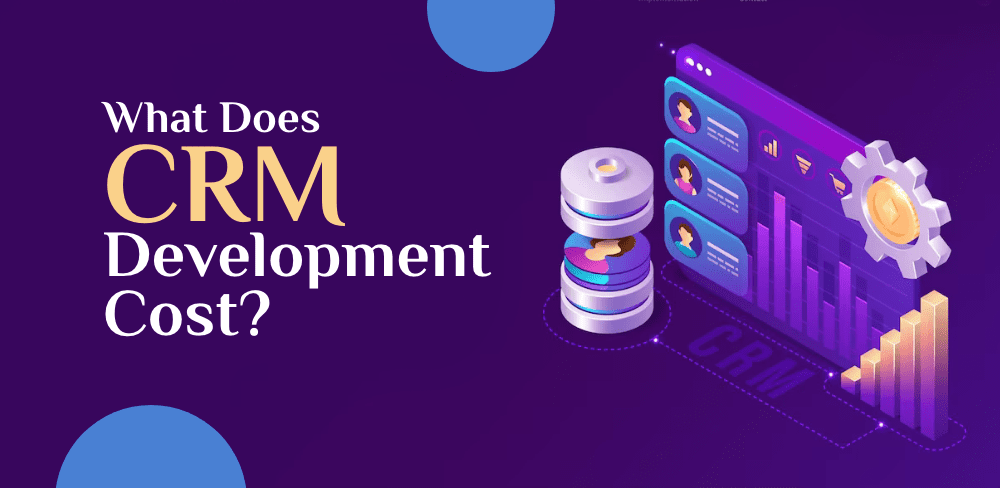“CRM is not just a software tool; it is a mindset, a philosophy, and a strategic approach to building long-lasting customer relationships.”
– Marc Benioff
How Do I Create a CRM System? What are the benefits of CRM software? How much does CRM Development Cost? The demand for customized CRM solutions has made these questions more frequent. But what exactly is all this about?
CRM Software has a market that is among the largest in the world. It is expected to grow from $80 Billion by 2025. And the reason behind the explosive growth of CRM is also very clear.
These solutions help companies of all sizes worldwide expand operations, acquire more clients, develop a closer relationship with customers, and streamline processes.
Customer Relationship Management software has been shown to enhance conversion rates by up to 300%. The truth is that CRM software can be expensive. However, it pays off 10x.
For ROI, a CRM system can surpass 245%. The ROI of CRM software is 30,48 cents for each dollar spent. This is why 89% of companies with at least 10 employees use a CMS.
These huge rushes towards CRM have inspired other corporations and Startups to develop their own CRM solutions. This blog is aimed at those who wish to learn more before investing in CRM software.
Thus, here we’ll discuss everything related to CRM and CRM Development Costs. So let’s start the blog.
What is CRM?
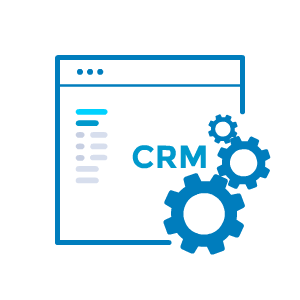
The CRM tool promotes communication and connections across all organizational areas. It is a technology that facilitates effective customer storage and data management. It helps organize the sales, marketing, and hiring departments properly. CRM software also aids in preserving a strong connection with clients.
Software capabilities like email, online spreadsheets, notifications, and chat are available to manage the process. CRM allows managers to track employee performance and helps teams register sales data.
This can affect the overall CRM development cost and helps management to easily measure productivity. The automated services offered by CRM software handle clients in line with the set methodology.
Market Stats of Customer Relationship Management
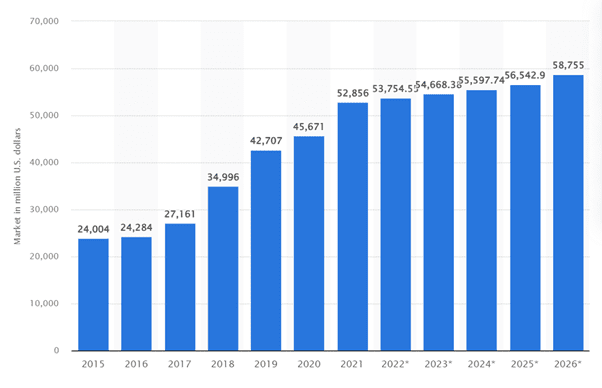
- The global customer relationship management (CRM) software market is forecast to grow to 57 billion U.S. dollars in size in 2025. This is a projected increase of almost four billion U.S. dollars from 2021, at a compound annual growth rate (CAGR) of 2.1 percent.
- In 2023, the customer relationship management software market is anticipated to generate US$79.40 billion in revenue.
- By 2028, the market is projected to reach a value of US$131.90 billion, with revenue predicted to increase at a 10.68% CAGR over that period.
- In the customer relationship management software market, the average spend per employee is anticipated to reach US$22.81 in 2023.
- In 2020, Adobe’s share of the worldwide market was zero percent.
- In terms of worldwide comparison, the United States will produce the most revenue ($40,750.00m in 2023).
How Does CRM Work?
CRM, which stands for Customer Relationship Management, is like having a digital assistant to help you manage customer interactions.
At its core, CRM collects and organizes customer data from various touch points such as emails, phone calls, social media, and website interactions. This data includes customer contact information, purchase history, preferences, and other relevant details. The CRM system then centralizes and stores this information in a user-friendly interface, accessible to authorized employees.
Once the data is in place, CRM enables businesses to analyze customer behaviors and patterns. This analysis helps identify valuable insights like customer preferences, buying habits, and potential sales opportunities. By understanding their customers better, businesses can tailor their marketing efforts, personalize communication, and offer targeted promotions or recommendations.
Furthermore, CRM facilitates efficient communication and collaboration within an organization. Team members can access and update customer information, track interactions, and coordinate tasks.
This ensures everyone has a comprehensive view of the customer’s history and current status, enabling seamless customer service and support. So now you are well versed in the working mechanism of CRM, you should now hire dedicated developers to build your own CRM software, but before you must determine the estimated CRM development cost.
Benefits of Customer Relationship Management Software
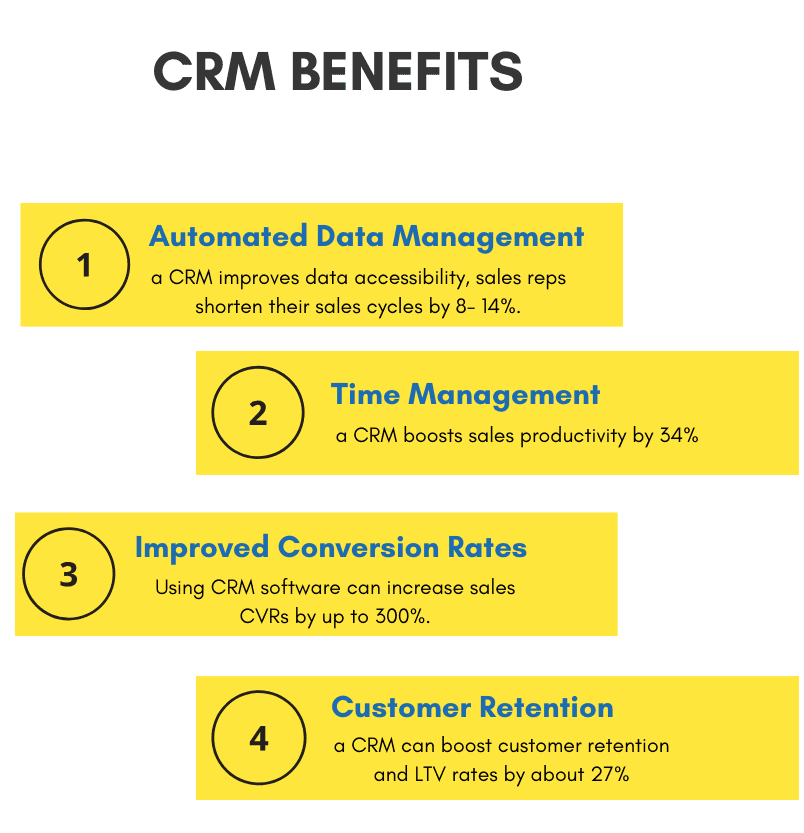
Any CRM software will help businesses to retain and attract existing customers. They are useful in all stages of client communication.
Some CRM features may make a good impression on the customer during the first meeting. The software can then cultivate loyalty by offering personalized promotions to the customer. The description of custom CRM software isn’t complete. Even these facts can explain why mass-market solutions do not work as well as custom solutions. If you dig deeper, the problem gets even worse.
In order to avoid these drawbacks, many businesses choose to create their own digital tool for managing customer data and improving marketing. They capture some of the key benefits of custom CRM systems:
1. The Solution is Tailored to Your Needs
You will pay extra for features you won’t use or those you don’t want. Customized CRM systems are flexible and are tailored to meet your specific needs. Your CRM can include whatever you like, depending on your past client support and sales experiences. Your team can easily test new features or modify existing ones.
2. Automating Workflows
The user journey of your target audience may include multiple unique phases. Retention of customers is no different. Custom CRM systems can automate marketing, analytics and sales, customer service, billing, delivery notifications, and billing. They could also save you money. Packaged solutions are only intended to satisfy the demands of various enterprises. Thus they are not always able to automate particular processes.
3. Data Aggregation, Editing, and Centralization
With custom-built CRM software, you can have full control over what’s happening in your company digitally. Some CRM providers offer a monitoring feature, but no one can fix a system error as fast as your team. Utilizing databases in a manner that is usually acceptable to your firm is another benefit of a bespoke CRM.
4. Customer Insight Analytics
Do you want to give your business a new lease of life? You can’t figure out when you lose your customers. You need to use a tool that allows you to analyze your customer’s insights for these issues to be solved. Pre-built CRMs will remove customer information such as age, location, and order volume. What if you require a combination or feature of the customer that is not included in the packaged CRM system?
5. Scalable CRM App Ecosystem
The CRM system is not uniform in appearance. It contains various technologies and apps intended to simplify the life of particular departmental employees. Waiters at a café, for example, need a system to take orders.
Marketers from the same CRM development company require an application to develop and distribute promotional notifications. It isn’t easy to create all the CRM apps simultaneously. Custom CRM solutions simplify the process. You can build the system in small sessions and then scale it up or down.
Types of CRM Tools
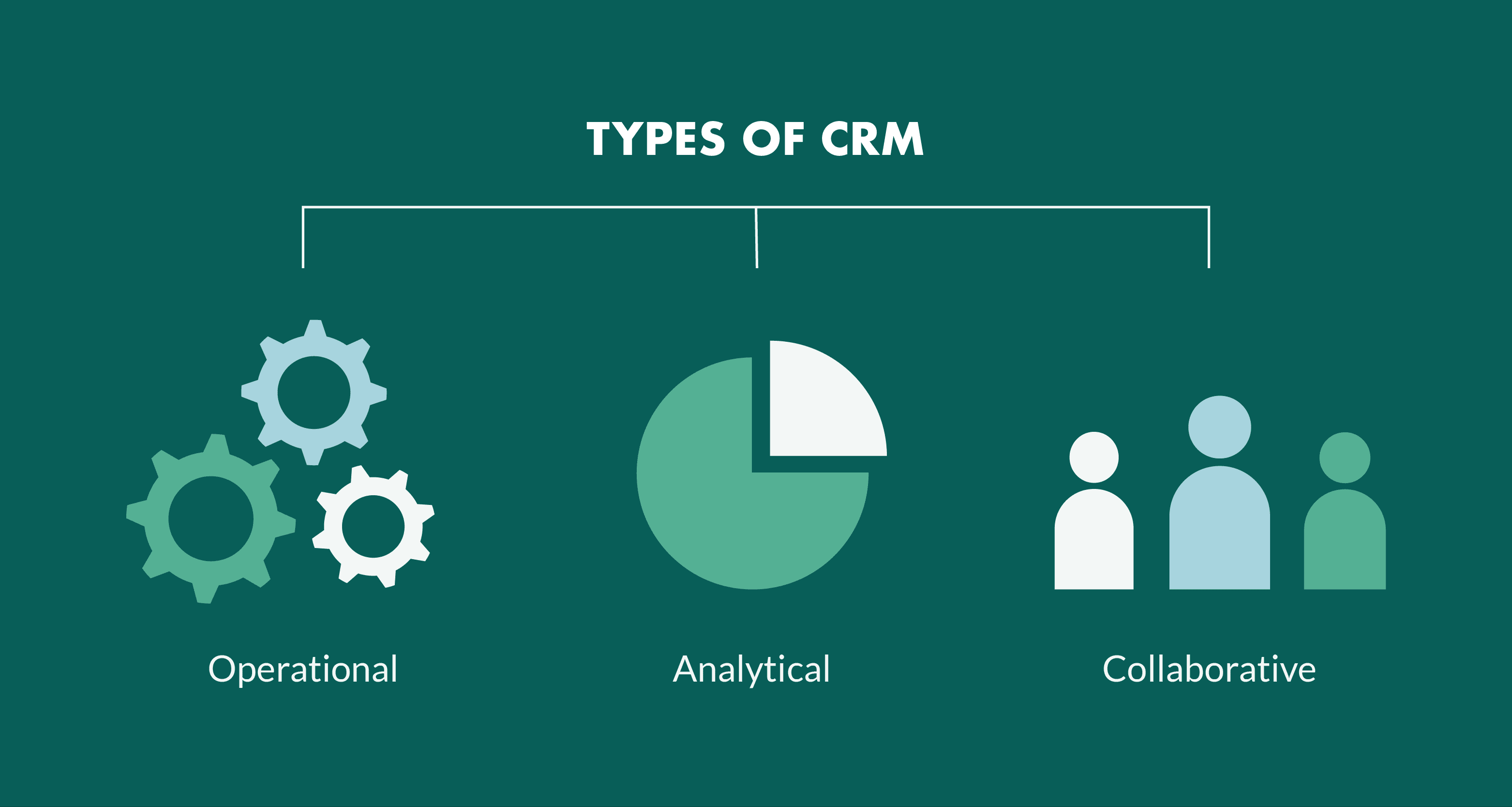
Before buying or designing CRM software, you must choose the best type for business purposes. So, CRM tools come in three different varieties.
- Collaborative CRM: This tool type will improve the understanding of data, workflow and other departments. Cooperating involves exchanging information amongst marketers, salespeople, customer support agents, and other divisions.
- Operational: Operational Customer Relationship Management is the automated process of finding leads and converting those leads into customers. The secret to making money is connecting businesses, services, and clients.
- Analytical: The name implies that it’s all about data analysis and reporting. Based on prior polls, it offers a comprehensive picture of the patterns, sales period, and much more.
Modules and Must-Have Features of CRM Systems
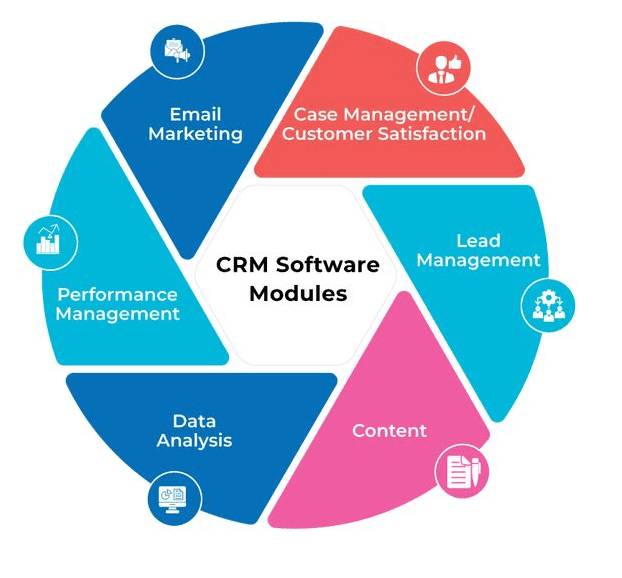
The number of features and complexity in the CRM system are the primary cost drivers, directly affecting the overall CRM development cost. So, it is important to understand the type of CRM your business requires and the modules it should include to avoid overspending. To help you get a better idea of what is available, we have compiled a list of the most important modules, along with their essential features, that are given by a PHP development company.
1. Marketing Module
Marketing process automation allows you to organize your marketing processes, create more effective marketing campaigns, and track their performance. This module has three key functionalities:
- Campaign Management: This tool allows specialists to track and execute marketing campaigns based on events by storing information, creating alerts, automating certain activities, assigning tasks, and communicating with other colleagues via the system.
- Customer Segmentation: Marketing experts may accurately analyze the best approach and make efficient decisions based on consumer behavior patterns, preferences, and profitability by segmenting the client base using sales data.
- Marketing Analytics: Real-time Analytics allows you to evaluate quickly the effectiveness of active marketing campaigns and their Return on Investment.
2. Sales Module
Automating some sales processes improves the performance of your Sales team. It helps you to close new deals quicker and manage existing and potential clients. The sales module has the following main functions:
- Account and Lead management: This is a key function of the Sales department. These functions allow sales representatives to create new accounts, manage leads easily, convert them into opportunities, and track their progress. This tool provides visibility to all lead data, including negotiations.
- Sales Analytics: This feature provides sales teams with a clear view of their success. It is important for tracking trends in sales, sharing data among colleagues, and adapting strategies. The flexibility to input and aggregate data from different sources, customizable dashboards, and filtering tools are all crucial.
- Planning and Forecasting: This tool is designed to help sales professionals plan their strategies and actions based on data provided by the marketing department. It also provides a convenient way to set goals, define strategies, create reminders, and assign team members to certain objectives.
3. Customer Support Module
A well-established process of customer support is crucial to retaining customers. Consistent and accurate communication is the key. A CRM system can help you handle client communication efficiently and collect all the customer data from different platforms into one database.
- Help Desk and Agent Console: You may use this function to save any consumer requests or grievances through various channels (emails, messages, social media, etc.). This feature enables the central storage of all client requests and grievances from multiple channels (email, messaging, social media, etc.).
- Knowledge Base: Support representatives can use this database to edit the answers to frequently asked questions and make them available to customers for self-service while they deal with more complex requests.
- Service Analytics: Similar to marketing and sales teams, the Customer Success team must also be able to track their performance to improve. This is done by analyzing the statistical data about client requests from different sources.
Factors Affecting the CRM Development Cost
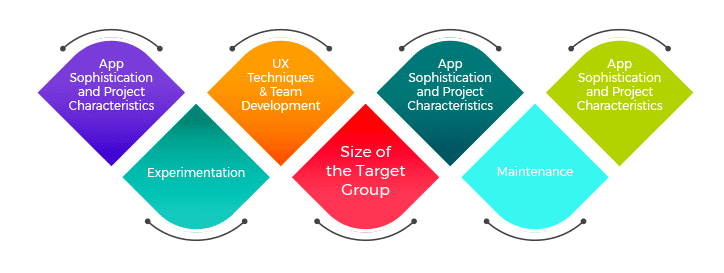
Various factors might affect the CRM development cost. Organizations must comprehend these aspects to effectively manage resources and make educated decisions. The following factors affect the CRM development cost:
1. Complexity of Software
The higher the complexity and features of the CRM, the more expensive the development and implementation will be. Custom modules, advanced reporting capabilities, and integration with third-party services or tools can be included in a CRM tailored to an organization’s specific needs. The level of customization will impact the CRM development cost.
2. Development Time
The length of the development process has a direct impact on the CRM development cost. Costs are usually higher when the development time is longer due to more developer resources and hours. The time it takes to develop a system depends on its complexity, the size and composition of the team, and any other factors such as data migration or existing systems.
3. Integration with Existing Systems
Integrating a CRM into existing systems such as ERP, marketing automation, and finance software is often necessary. This integration is time-consuming, complicated and increases the CRM development cost.
4. Data Migration
It can be difficult to migrate existing customer data into the CRM. It may be necessary to clean and format data to maintain consistency and compatibility. Processes to prevent data loss or to maintain data integrity will also need to be implemented. CRM development costs of data migration are largely determined by the size and complexity of the data to be transferred.
5. Training and Support
To implement a CRM, employees must be trained to use it and manage customer relationships efficiently. CRM development costs also affected by training and support include preparation of materials, staffing for training sessions, and ongoing assistance in resolving any questions or issues that may arise. So to reduce the training cost, it would be best to consult a reputable company that provides web developers for hire who are experienced and well-trained.
6. Software Licensing & Ongoing Maintenance
Software licensing fees and maintenance fees may be required for custom CRM solutions. The costs of maintaining a CRM system can be minimal or significant depending on the technology and platform used. These fees can also include bug fixes and system upgrades to ensure that the CRM continues functioning and being effective.
What is the Average CRM Development Cost?
Ever wondered why it’s so hard to find the CRM development cost in Google? There is a good reason for this. A CRM does not have a set price. The many components involved in development significantly impact the overall cost.
The cost of every project is affected by a different set of factors. It is, therefore, impossible to accurately predict the cost of Customer Relationship Management software. Not all is lost. However, we can’t give an exact estimate of the CRM development cost, but we can give a range.
Developing a CRM can range between $8,000 and $25,000. If you want a more accurate estimate, you should consult a web development company specializing in CRM development. They will be able to give you an accurate cost quote based on your organization’s business needs and preferences.
Some Additional CRM Development Cost
The CRM development cost is not limited to direct costs incurred in creating the product. The real cost includes personnel training, system upgrades, and project development expenditures. So let’s check out:
1. Costs of Custom CRM Systems
Preparing for a CRM begins with understanding its purpose and basic needs. Each criterion defines a specific feature that a CRM system should offer. This service includes market and domestic research, marketing analysis, competitor analysis, and developer advice.
2. Staff Training Expenses in Adopting the CRM Software
Training costs are directly related to the amount of time and effort invested. The procedure requires an acceptable protocol. Certain staff members are often the first to review the program before it’s released to the public. Then, they will pass on the information and skills to the rest.
Training materials can also help staff to resolve any issues they might have with the CRM system. Step-by-step directions for resolving issues should be included in these recommendations and expressed in simple English.
3. Technical Support Expenses Connected with CRM Development
Even the most expensive and complex CRM systems can have errors and faults. A technical support solution is needed to fix the problems that employees face. You can hire a single technician or a fully-fledged CRM development company.
4. Upgrades and System Updates Can be Expensive
The CRM software needs to be regularly updated to maintain its maximum functionality. This will affect the CRM development cost, and employee feedback is a good starting point for system improvements.
Conclusion
When considering the cost of CRM development, it’s important to understand that the expenses can vary depending on several factors. These factors include the complexity of the CRM solution, desired features and functionalities, integration requirements, and the development team’s expertise.
To ensure a successful CRM implementation, it’s advisable to hire web developers who specialize in CRM development. While the exact cost may vary, investing in skilled developers can provide the expertise needed to build a customized CRM system that aligns with your business goals and delivers long-term value.
FAQ
1. How Can I Integrate Custom CRM Software with Other Systems?
Custom CRM software can be integrated with other systems like marketing automation tools, email clients, accounting software, customer support platforms, and e-commerce platforms to streamline data and workflows.
2. How Much Time Does it Take to Build a Custom CRM?
The time required to build CRMs can vary depending on the scope and complexity of the project. It may take 3-7 months or more on average, considering factors such as requirements gathering, design, development, testing, and deployment. Specific customization needs and the availability of development resources can influence the timeline.
3. Can I Migrate Data from My Existing CRM to a Custom CRM?
Data migration from an existing CRM to a custom CRM is possible. The complexity and cost of data migration depend on the amount of data, data structure, data quality, and compatibility between the systems.
4. Can I Customize the CRM Software to Suit My Specific Business Needs?
Yes, one of the advantages of custom CRM software is the ability to tailor it to your unique business processes and requirements. Customization ensures that the CRM aligns perfectly with your workflows and goals.




